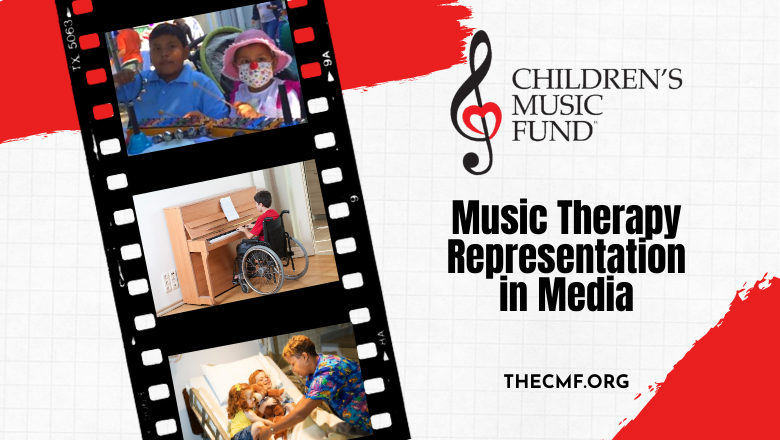
October 18, 2020 | Blogs and News
By Mireille Karadanaian — 2.5 min read —
A critical part of recognizing the power of Music Therapy is spreading awareness about it’s benefits. By sharing your experiences with music therapists, engaging with nonprofits like the Children’s Music Fund and staying educated about the ways music therapy affects our brain, you can successfully reach and impact different communities.
Recently, there has been a spike in Music Therapy representation in media, particularly film and television. In a media-defined world where our strongest connections lie with the devices in our hands, it’s important to acknowledge the impact of Music Therapy in the film industry and in the world.
Film: The Music Never Stopped
Music Therapy representation in film started to spike in 2011 with the film “The Music Never Stopped,” based on the essay “The Last Hippie,” by Dr. Oliver Sacks, a Music Therapy advocate. It was a story of a young man who was diagnosed with brain cancer and forgot the past decade of his life.
The movie highlights his journey to recovery and his family’s advent in believing in music as the most important saving grace for their son. They connected him with Dr. Dianna Daly, a music therapist based on the real life practitioner Dr. Concetta Tomaino. She discovers the key to aiding the ill Gabriel, connecting him to the world through his favorite band, the Grateful Dead. The lyrics and power behind each song inspire Gabriel to form new memories with his loved ones and fall in love.
In addition, music requires both the involvement of the left and the right hemispheres, engaging your entire brain. Therefore, like in the story of Gabriel, music aids in bypassing barriers borne from brain damage, and works to create new neural pathways considered pivotal when it comes to reconnecting with speech and communication.
Film: It’s Kind of a Funny Story
A similar 2011 film, “It’s Kind of a Funny Story,” is set in a psychiatric ward where a music therapist often works and aids the patients with “musical exploration.” They play instruments and sing songs together, learning to express repressed emotions and connecting with others around them, despite mental barriers. The film calls to attention the non-invasive, fun and beneficial practice of Music Therapy and how it brings groups of disparate people together.
Documentary: The Brain’s Way of Healing
In the documentary industry, Dr. Norman Doidge introduced neuroplasticity to our world seven years ago. He shared with us the idea that the circuits in our brain are capable of changing and reforming through mental experiences and activities we encounter throughout our lives. In his new film, “The Brain’s Way of Healing,” he shows how the brain can not only change, but it can form connections that heal.
His Music Therapy study is centered around non-invasive methods of treatment where patterns of energy are used to resynchronize the neurons in our brains that are being fired improperly during illness. He shares the stories of different people around the world who seemingly “walked off” illnesses, like a man in South Africa who overcame his Parkinson’s disease. He says, “light, sound, vibration, electricity and motion – these are forms of energy that provide natural noninvasive avenues in the brain that pass through our senses and our bodies to awaken the brain’s own healing capacities.”
Music Therapy is revolutionizing the medical and biopsychosocial field. Here at Children’s Music Fund, we connect chronically ill and hospitalized children with board certified music therapists who help alleviate their symptoms of pain, fear and anxiety through musical demonstrations and sessions.
We believe that now more than ever, it is crucial to use science and medicine to look at the brain differently and understand that we can utilize music to create an environment of hope, positivity and change.
To seaemore about the mentioned films/documentaries visit the links!
- “The Brain’s Way of Healing”
- “It’s Kind of a Funny Story”
- “The Music That Never Stopped”
Join our mailing list and keep up with our CMF Kids’ stories by texting “CMF” to 22828.
